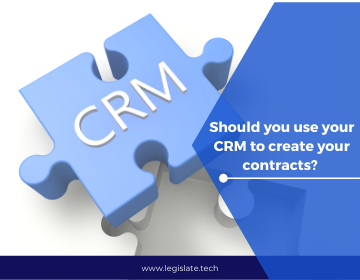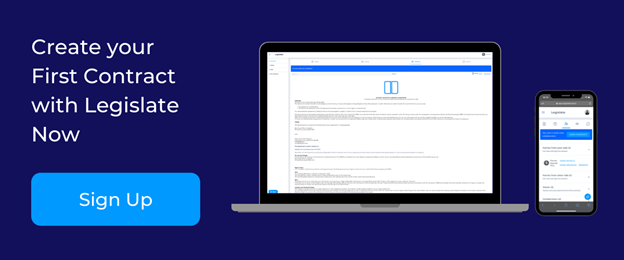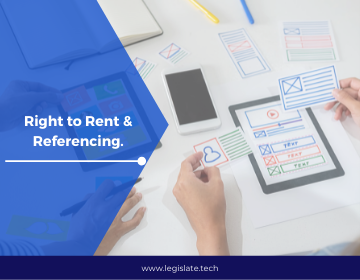Legislate is an easy-to-use online software platform which helps landlords and letting agents create, sign and manage lawyer-approved legal documents.
Legislate is the perfect platform for landlords and letting agents who aren’t satisfied with the contract capabilities of their all in one property management platforms either because the experience is painful or because they lack the flexibility to create “non-standard” contracts.
For landlords and letting agents looking for a more professional and transparent contract experience for their tenants and who want to save time and avoid mistakes in the contract creation process we recommend you give Legislate a go.
If you’re tired of sending tenants copies of their tenancy agreements then what better solution than their own online contract portal which they can access at any time?
Legislate’s lawyer reviewed contracts are written in plain English and are tailored automatically to your requirements. Legislate’s contract suite includes:
Assured shorthold tenancy agreements (HMO, bedsit, sole-occupancy, student)
Lodger licence agreements
Residential Lettings Agency Terms of Business
Guarantor agreements
Rent increase letters
Tenancy amendment letters
Section 8 and 21 notices
Employment agreements
Privacy notices
For a covid-secure approach to creating and signing tenancy related documents, join Legislate today.
Contact details:
Email: info@legislate.tech
Website: https://www.legislate.tech
Blog: https://www.legislate.tech/blog
Telephone number: 01434400063

Why CRMs should not be relied upon for contract creation and management.
Customer relationship management platforms (CRMs) are useful tools that make business development processes more efficient and have grown to become the norm in business operations. CRMs allow letting agents to manage prospects and to keep track of the progression of housing deals and tenant and landlord interest to form a coherent commercial pipeline. Whilst a well maintained and organised spreadsheet could organise this data coherently, CRMs make this process more efficient and digestible by the entire office, not just the spreadsheet keykeeper. Given the success of CRMs in tracking and organising data, many are now expanding their capabilities to man operators with the tools to not only organise their data but also to act upon it. For example, CRMs now allow letting agents to generate and sign contracts, such as assured shorthold tenancy agreements, with the prospects (tenants and landlords) stored in the CRM. Whilst this might be useful in enabling any member of staff to create agreements, CRMs cannot and should not be relied upon to organise or manage those contracts.
Read on to learn about the limitations of CRMs for contract management and how these issues can be overcome by adopting more specialist, targeted software, such as Legislate.
1. Legal updates
Firstly, whilst legal updates might seem infrequent and therefore insignificant, ensuring you are up to date with any changes is one of the surest ways to manage risk in your agency. The changes to notice periods brought about by the pandemic this year highlight the importance of forecasting and monitoring legal changes that affect your industry.
As we’ve outlined above, CRMs were not built to create and send contracts- they later developed this capability. The issue with this is that they are not well equipped to track legal updates, such as the Tenant Fees Act 2019, and therefore may not provide up-to-date contract templates. When using contracts provided by a CRM, it is difficult to know when a template was approved, by who and whether it is out of date. Contract management platforms like Legislate are built with this in mind: contracts are lawyer-approved and updated in line with all legal changes, such as those now surfacing post-Brexit.
2. Flexibility and non-standard terms
Another difficulty of using CRMs for your contracts is that whilst templates can be adapted to specific tenants, such as to include a break clause, permit pets or operate as a HMO, CRMs are not equipped to keep track of these template variations and the consequences of these variations outside of the contract. Some of these variations might create additional rights or obligations, for example the need for HMO licensing or further obligations relating to fire safety. Furthermore, these additional obligations may apply to team members who don’t have access to the CRM which is why it is critical that they are aware of them. Contract management platforms allow all team members to know which percentage of your contracts have non-generic terms and how they impact each individual dealing.
3. Customer experience
Thirdly, contracts generated by CRMs typically take the form of PDFs which are convenient to send but difficult to process, understand and manage post signature. Tenants receiving lengthy PDFs, often written in legalease, are likely to feel overwhelmed and struggle to fully understand and extract the core elements of the contract to fully understand their rights and obligations. Furthermore, with contracts stored in the CRM, tenants cannot readily access these contracts post-signature, instead having to trawl through emails to locate the PDF that has been manually shared with them post-signature meaning when they have queries relating to the tenancy, such as duties of repair, they are less likely to find this information out for themselves.
In contrast, contract management platforms are built with these difficulties in mind. Legislate, for example, automatically creates a vault of contracts, letters and notices for the tenants so that they can readily access their contracts in one place, pre and post signature in a matter of seconds. The platform also breaks down the core terms of the contract, representing each parties rights and obligations, so that these can be understood without needing to sift through the actual contract. These approaches offer a more complete and enjoyable contracting experience to your tenants, making your agency look more professional and laying the foundations for a strong and trusting relationship.
4. Making use of your contracts
Finally, whilst CRMs report on the total value of your contracts, these values are skewed by contractual conditions, such as break clauses, and they are not proficient enough to read further information between contracts. Using CRMs might provide you with an overall picture (although potentially one that is over-reported and inaccurate) but they cannot provide you with themes and information across your contracts. For example, you will not be readily able to retrieve how many contracts contain break clauses or the ratio of your sole occupancy to HMO agreements. Contract management programmes allow you to make observations between contracts so that you can readily find themes and statistics from across your contracts.
Conclusions
In this article we have shown that whilst CRMs are an efficient and effective way to manage your tenants and properties their capabilities do not transfer well to creating and managing contracts and might create legal risk for your agency. Whilst the ‘one-fit’ CRM solution might seem appealing, using a contract management platform in parallel to your CRM will not only create a better customer experience, provide you with greater flexibility and allow you to make use of the information contained within your contracts but it is also the surest way for you to avoid and manage legal risk.
To see how a contract management platform might work for your agency, create your first contract for free on Legislate and see the benefits for yourself.

